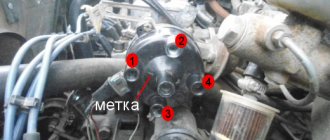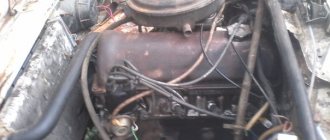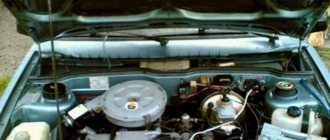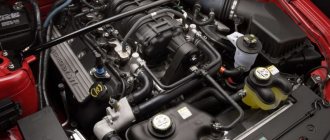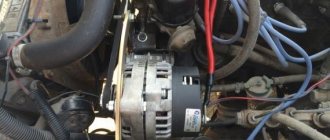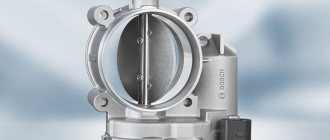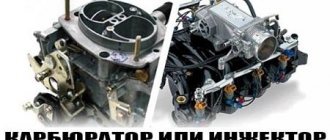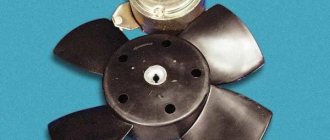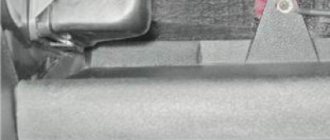Popping sounds in the muffler when starting the engine, when pressing and releasing the gas, idling or when braking the engine are common phenomena that many car owners encounter.
Such a problem may indicate an engine malfunction, problems in ignition settings, or timing malfunctions.
If a breakdown is identified, it is important to fix it to avoid even more serious problems.
The article discusses the main causes of muffler pops, which are typical for most car brands. Then we will dwell in more detail on the models VAZ 2106, VAZ 2109, VAZ 2114, VAZ 2115 injector, UAZ, GAZelle and cars with ZMZ 402 engines.
When the silencer is fired
The main reason for “shooting” at the muffler can be called incomplete combustion of the working mixture in the combustion chamber.
Next, the fuel-air composition explodes inside the intake mechanism due to heating to high temperatures. As a result, a strange sound similar to cotton appears.
This malfunction can occur in any engine - with an injector and a carburetor, regardless of the type of fuel used. One of the reasons is considered to be a phase mismatch of the timing mechanism.
But this is only one of the options. A range of work may be required to identify and eliminate the malfunction.
Can a bang in the muffler damage the engine?
Shots in the exhaust system are considered a consequence of failures in engine adjustment and a violation of its settings.
This indicates the need to check three systems - ignition, timing and fuel supply.
If you delay repairs, there is a high risk of engine damage.
Untimely restoration can lead to damage to the integrity of the valves, malfunction of the exhaust system, and even a car fire.
The only positive aspect of “sneezing” is the ability to detect a malfunction in advance and take action.
During the repair process, a comprehensive check of the internal combustion engine, adjustments and installation of new consumables are often necessary.
Checking the carburetor and air filter
It is not always possible to figure out why shots appear in a silencer. The first assumption that car owners make is that the timing belt is malfunctioning. But the reasons may be different.
Before starting work and checking the engine, it is worth understanding the principles of this phenomenon.
An explosion in the exhaust pipe is evidence of combustion of the fuel mixture outside the combustion chamber.
The first thing to start with is to check the condition and correct settings of the carburetor, as well as the air filter.
Practice shows that a fuel mixture that is too rich does not burn completely, and its remains end up in the exhaust manifold, and then in the muffler.
The existing temperature in the duct is sufficient for the finished mixture to ignite with the appearance of a characteristic pop.
In such cases it is recommended:
- Remove the air filter and replace the internal filter element.
- Check the fuel supply adjustment in the carburetor.
Conclusion
At the end, it is worth summing up all of the above. Firstly, popping noises in the muffler are a non-critical problem, but quite unpleasant, and it’s worth addressing it as quickly as possible. Secondly, in addition to external sound factors, there are also internal ones, which lie in the fact that the engine and gas exhaust systems will deteriorate. In addition, slamming means excessive consumption of fuel, which means an increase in the cost of purchasing it. When a car is used for a long time with such a problem, certain parts may burn out, which will completely disable the car and require more money and time for repairs. Popping noises in the muffler on an injection engine may not be eliminated without diagnostics.
Source of the article: https://fb.ru/article/423082/hlopki-v-glushitel-pri-sbrose-gaza-v-injektore-vozmojnyie-prichinyi-sposobyi-ustraneniya-neobhodimaya-profilaktika
The influence of thermal clearance on popping noises in the engine
When malfunctions occur in the engine and the first explosions in the muffler, car owners test the car under various loads.
Thus, the appearance of popping noises at any speed (high, medium and low) may indicate failures in adjusting the thermal clearance of the cylinder head valves.
The solution is to disassemble the motor and use a tuning tool. After performing the check, you can draw conclusions about the causes of the problem.
The camshaft cams and tappets should have a small gap where they touch the valve stem.
After heating, the metal parts increase in size and the gap decreases.
If the adjustment is made correctly, the valves completely close the gap, and if this parameter is violated, a gap remains through which the mixture exits into the exhaust manifold.
The result is the ignition of unburned fuel in the engine. To “treat” popping noises, it is necessary to adjust the cylinder head valve clearance. It is also important to pay attention to the color of the smoke from the exhaust pipe.
Violation of timing settings
Failure of valve timing settings and premature opening of exhaust valves can also cause the car to shoot out of the exhaust pipe. In this case, events develop in the same way as with ignition problems - part of the unburnt fuel enters the manifold under strong pressure and the burning gases provoke a loud bang.
Healthy! If the car has electronic timing control, then it is worth checking the electronics.
Owners of VAZ 10s and diesels most often encounter this problem. In this case, the popping noise appears only when the engine is warm. Since a timing belt failure can lead to quite serious consequences (breakage of pistons or valves), repairs must be made immediately. Otherwise, you may end up with a major engine overhaul.
It is also worth checking to see if the timing belt has slipped or stretched. It has special teeth with which the gear engages. If at least one of these teeth breaks off, the operating mode of the motor will be disrupted and, as a result, characteristic popping noises will appear.
Ignition timing
Now let's figure out how late ignition affects it.
Another reason that fuel explodes in the muffler is due to ignition problems.
To confirm or exclude this assumption, it is necessary to check the correct setting of the timing in the ignition system. If the latter is set up late, shots cannot be avoided.
This is due to the fact that the spark fires with a delay, already at the moment the exhaust valve opens. As a result, a certain volume of fuel ends up in the collector.
If you ignore the problem, there is a high risk of burning out the valves and exhaust pipe.
If there are no problems with the ignition, and it is configured correctly, shots still appear at the moment of starting or driving.
The reasons may be the following:
- Weak spark.
- Bad wire contacts.
- Malfunction in the distributor or contact group.
One of the reasons for the deterioration in spark quality is a problem with the spark plugs, so you need to unscrew each of them one by one and check the quality of the contacts.
The muffler may still fire due to an incorrectly selected spark plug heat rating.
Checking the spark plug wires
When servicing a car, car owners are often forced to remove high-voltage wires to twist and check spark plugs.
Subsequently, the products can be put into place without checking the correct connection.
This approach is dangerous, because mixed up wires lead to unpleasant consequences - instability of the motor and popping noises.
If, when you first try to start the engine, shots appear in the muffler, this is a reason to check the correct location of the cords.
Also read why spark plugs turn black.
Timing belt slipped
If the exhaust system starts shooting, you can’t dismiss problems with the timing belt.
As noted, one of the reasons for such a malfunction is malfunctions in the gas distribution mechanism.
As a result, the exhaust valve opens before the fuel has time to burn, and the remaining fuel burns out in the exhaust pipe.
The likely cause of such failures is stretching and slipping of the timing belt.
If shots in the muffler occur only on a warm engine, but not on a cold engine, we can confidently talk about problems in the timing belt.
Timing
Broken spark plug
Another reason that affects problems in the exhaust system is a phase violation in the gas distribution mechanism. In order for the power unit to function normally, the movement of the valves must be clearly coordinated with the compression strokes. Otherwise, the entire process is disrupted.
Failures of this kind are practically impossible on machines with a chain, but with a timing belt this happens much more often. The reason is that the belt shifts by 1-2 teeth or stretches too much, which leads to problems in the GRS mechanism. It’s a whole science to be able to determine that the belt is aligned correctly.
If the popping noises are the result of a stretched or misaligned timing belt, they will appear on a hot engine rather than on a cold one.
Shoots into the muffler when releasing gas
Another situation is when popping noises appear when the gas pedal is released. How does the malfunction manifest itself?
At idle speed and when the gas pedal is pressed, the engine runs normally, but just release the pedal, and explosions are heard in the muffler area.
In this case, the engine continues to work and does not stall, and the traction remains at a high level. The only thing that changes is the XX “floats”. What to do in such a situation?
The main reason is the combustion of the combustible mixture outside the cylinder, and this is caused by the following:
- Low quality atomizers that do not spray fuel, but direct a stream into the combustion chamber.
- Low oxygen level in fuel. In this case, gasoline does not burn completely. In such a situation, it is important to control fuel consumption. If it has grown, you need to change the air filter and check the operation of the air damper.
- Excessive fuel supply is set.
There is another theory. If you press the gas sharply, the accelerator pump turns on, which enriches the mixture to the required level.
Misfires at high speeds are no longer controlled, and the fuel does not burn completely (the remainder is burned in the pipe).
Specialists at service stations say that the cause may be injectors (increased performance), increased pressure in the fuel rail, or late ignition.
The latter malfunction is often caused by the failure or “fatigue” of the knock sensor. In practice, there are cases when the control device fails due to constant noise in the engine compartment.
In the most difficult cases, conventional diagnostics are not enough - it is advisable to contact specialists at a service station and undergo a full test using special equipment, including using an oscilloscope.
Additional reasons
There are a number of other reasons why the exhaust pipe shoots. These include:
- Popping noises when idling the engine are possible for two reasons - a leak in the intake manifold, as well as a clogged idle system.
- Poor quality gasoline or gasoline with a low octane number. Try to refuel at reputable gas stations and use fuel recommended by the manufacturer of your car.
- Mixed spark plug wires . If, when replacing or checking spark plugs, you mixed up the wires connected to them, this will also be a likely cause of popping noises. In this case, the car may not start and “shoot” at the muffler.
- If your machine has an economizer , check its operation. Often the malfunction of this unit is also the cause of “shots”.
- Malfunction of the air damper . Check this element and adjust if necessary.
- One of the reasons when the muffler shoots when releasing gas is that the muffler downpipe ( “pants” ) is poorly screwed to the exhaust manifold. Check the tightness of the connection and tighten it if necessary.
- Another likely cause of popping noises is high performance fuel injectors (“leaking”). They supply too much fuel, which does not have time to burn completely, which leads to “shots”. There is a simple way to check. It is necessary to try to start the engine at high engine speeds (with the gas pedal depressed) (the so-called purge mode). If popping noises occur at this time, it means that at least one injector is leaking.
- In injection cars, late ignition and, as a result, popping noises can be caused by “fatigue” of the knock sensor . It can also respond to extraneous noises occurring in the engine. The operation of the sensor must be checked using computer diagnostics.
- If the muffler shoots when releasing gas , then one of the most common reasons for this is “burning” of the exhaust valves. Popping noises may also appear when descending a mountain in gear. Inspect and clean them.
- If your car uses a contact ignition system, then you need to check the gap on its contacts . Ignition problems, as described above, may be the reason that not all of the gasoline is burned.
- Leakage of the gas exhaust system . In this case, as a rule, single pops occur when the gas is released. First of all, check the gaskets at the connections of the pipes (catalyst, resonator, muffler).
Also, if lumbago occurs and traction deteriorates, it is recommended to check the fuel pressure in the system, as well as compression (cylinder tightness for leaks), and inspect the ignition coil.
Condensation in the muffler
The main reason for the formation of condensation in the muffler is the temperature difference between the ambient air and the muffler. Its formation in a car with a working catalyst is a natural phenomenon. It’s worse if it’s not there, but too much can cause corrosion. There is a Read more
As you can see, there are many reasons why a muffler shoots. Therefore, we advise you to start your diagnostics by checking the tightness of the exhaust system. Inspect the bolted connections and gaskets between its individual elements. This will save you time and money. This is especially true if popping noises are heard when releasing the gas or when descending a mountain in gear (when braking the engine).
If the audit does not give positive results, then it is necessary to check the operation of the carburetor, valves and other parts described above. This check is advisable if the muffler shoots when you press the gas .
The car won't start
Another problem that car owners face is shots in the muffler at the time of start-up.
The situation looks like this. The driver tries to start the car, starting does not happen, but there are quiet shots in the exhaust system.
If nothing is done, the next attempt may be fatal for the muffler - there is a high risk of damage due to an explosion.
In such a situation it is worth:
- Inspect and replace spark plugs if the electrodes are dirty.
- Assess the condition of the timing belt and, if necessary, tighten it or change it.
- Check the crankshaft position sensor and replace it (if it fails).
- Measure the pressure in the fuel line. If it is below three, the pump needs to be replaced.
- Check the compression in the engine. One of the reasons why the muffler shoots is because the rings are stuck. One option is to drain the oil and fill the cylinders with kerosene. After this, you need to twist the spark plugs and turn the starter. The machine must stand, then the kerosene is drained and oil is added. Now you can try to start the engine again.
- Disconnect the DTOZh sensor and start the engine with the device turned off. This action allows you to more accurately determine the cause.
Carburetor not tuned
Car carburetor
Often the reason that the engine shoots into the muffler is an incorrectly configured carburetor. Its task is to create a fuel-air mixture, which is then supplied to the engine. If it is configured in such a way that the mixture is oversaturated with gasoline, a situation similar to that described above is created. The solution here is to check and adjust the “carb”.
The first step is to check the fuel level in the chamber where the float is located. Each carburetor is individually adjusted and has its own level. However, if its cover is removed, the float should be flush with the level of the cover. If this is not the case, adjust the level. Also be sure to check the integrity of the float . If it is damaged, fuel may leak into it, causing it to display the level incorrectly.
The reason that the carburetor shoots into the muffler may also be the jets. They are either configured incorrectly or become clogged over time. If the air jet does not supply enough air, the mixture becomes oversaturated with gasoline with the result described above. Often this malfunction occurs when the engine goes from idle to higher speeds, or with a sharp increase in speed (acceleration). It is necessary to check the condition of the jets and clean them if necessary.
| Air/fuel ratio | Description | A comment |
| 6/1 — 7/1 | Extremely rich mixture. Ignition failure. | Rich mixture. Long burning, low temperature. |
| 7/1 — 12/1 | Overrich mixture. | |
| 12/1 — 13/1 | Rich mixture. Maximum power. | |
| 13/1 — 14,7/1 | Slightly enriched mixture. | Normal mixture. |
| 14,7/1 | Chemically ideal ratio. | |
| 14,7/1 — 16/1 | Slightly lean mixture. | |
| 16/1 — 18/1 | Poor mixture. Maximum efficiency. | Poor mixture. Fast combustion, high temperature. |
| 18/1 — 20/1 | Over-lean mixture. | |
| 20/1 — 22/1 | Extremely lean mixture. Ignition failure. |
Popping sounds in the injector - reasons
There is an opinion that shots in the muffler are a problem only with carburetor engines. This is wrong.
The injector is also not ideal, and the cause of “firing” may be a malfunction in the ignition circuit or in the thermal clearance of the valves.
In addition, it is possible that the contacts of the sensors may be damaged, because in the event of such a breakdown, erroneous data is supplied to the control device, and the ECU does not manage fuel correctly.
To determine the cause, detailed diagnostics of the machine is necessary.
What to do if the muffler of an injection engine shoots? Service station technicians assure that in such a situation it is important to contact specialists.
Otherwise there is a high risk of damage to the engine or muffler.
If we talk about the most common causes of malfunction, the problem may be hidden in the belt stretching or a tooth skipping.
Injection engine problems
Owners of cars with injection engines rarely encounter popping noises in the muffler. If such a problem does occur, then the reasons are most often the same as for carburetor-type cars - timing failure, incorrect ignition settings or broken thermal gap.
In addition, it is recommended to check the reliability of the contact sensors. If they do not work correctly, the electronic control unit will not distribute fuel correctly. It is almost impossible to identify such a malfunction on your own, so specialized diagnostics of the machine will be required.
Popping sounds in mufflers during HBO
After installing LPG, car owners may experience “shooting” in the exhaust system.
The main reason is gas supply failures, which are caused by incorrect settings of the gearbox or dirty air filter.
In addition, the cause of the malfunction may be the failure of the DPKV, so it is also worth checking. As a result, the mixture turns out to be too “poor” or “rich”.
As in the case of a gasoline engine, explosions of unburned gas can cause a number of malfunctions - damage to the air filter, failure of the mass air flow sensor, rupture of the muffler and destruction of the engine valves.
In the most difficult cases, a fuel fire under the hood may occur.
To eliminate problems during the installation of gas equipment, it is important to fine-tune the ignition system and maintain it in perfect condition.
Before installing gas equipment, the ignition system must be configured. The condition of the air filter is of key importance, and it is recommended to update it taking into account the manufacturer's recommendations.
Also, after installing the LPG, it is necessary to set the correct advance angle using a special octane corrector.
What to do if the silencer is already firing? In such a situation, there are three steps to take:
- Adjust the valves;
- Adjust the ignition;
- Carry out preventive measures in relation to the gearbox.
When the injector and diesel fire
In old power diesel devices, it was possible to manually mechanically adjust the timing of diesel injection. If the adjustment was carried out incorrectly, the fuel was compressed too much and white smoke came out of the engine. Today, such a situation is rare, since everything is controlled by electronics, including VAZ and Gazelle.
But there are other reasons that cause shooting in modern systems:
- The lambda probe, DBP and mass flow sensors are broken, or the throttle position is incorrectly set.
- The high voltage ignition unit is faulty.
- Controller errors.
- The working surface of the crankshaft position sensor is excessively contaminated with metal shavings.
If it is assumed that the problem is due to controller errors, then you can try resetting the settings by disconnecting the battery for fifteen minutes. Even if the method helped, it is still recommended to check the car at a service center to avoid a recurrence of the situation.
If, when releasing gas, the power unit often fires, then there is a possibility of problems with the gas equipment of the car. The system supplies liquefied propane to the cylinders under the control of a separate electronic unit; the process involves a reducer and valves along with a cylinder. If any breakdowns occur in the system, the gas will overflow, resulting in popping noises. There is no need to explain why to go to the service center in this case - independent repair is impossible.
Let's analyze situations for different cars
Now let’s look at the causes of the malfunction in relation to certain car models:
VAZ 2106, VAZ 2109.
And other representatives of the domestic automobile industry are susceptible to the appearance of shots in the muffler. A common cause is a misconfiguration in the ignition system.
The spark fires, but with a delay, at the moment the exhaust valve opens, and not at the moment of greatest compression.
The result is that part of the combustible mixture ends up in the manifold.
The reasons may be the following:
- Incorrect advance angle adjustment;
- Failure of the ignition module;
- Weak spark;
- Incorrect installation of wires on spark plugs;
- Failures in timing settings;
- Belt stretching and slipping in the timing system.
If shots in the muffler appear when the gas is pressed in VAZ 2106 and VAZ 2109 cars (at low speeds), the cause may be a violation of the valve clearance.
In its absence, part of the fuel ends up in the collector, and the consequences in question become inevitable. The solution to the problem is to replace the valves or adjust them.
For cars of the brands in question with an injector, this problem is also typical, but it appears less frequently.
A common cause is a timing fault, incorrect ignition setting, or thermal gap failure.
Here it is recommended to check the correct operation of the sensors and the quality of the contact connections.
If these elements do not function correctly, the ECU system will not be able to distribute fuel correctly.
To identify such a problem, it is recommended to contact specialists at a service station.
VAZ 2114, VAZ 2115, injector.
Why does the muffler shoot but the engine won't start? If a breakdown is detected, it is recommended to start with the spark plugs and blow them out by cranking the starter and firing the gas to the floor.
The next step is to check the performance of the DPKV. The algorithm is as follows:
- Dismantle the device and perform an external inspection. Suspicion should be caused by damage to the housing, core, sensor or terminal block. The wire connections must be clean. If there is dirt on the contacts, they can be removed using an alcohol-gasoline mixture. The result of the work should be complete cleaning of dirt and dust.
- Check the active resistance of the DPKV. Measurements are made between the first and second contacts on the sensor block. For measurements, you can use a special voltmeter or multimeter. The optimal resistance is 550-700 Ohms. It is advisable to do the test at room temperature (20-22 degrees Celsius). When determining the final result, it is important to take into account the instrument error.
- Measure the inductance of the winding between the same contacts. It should be 250-420 mH.
- Make sure that the insulation between the terminals and the core of the device is at an optimal level. A 500 V megohmmeter is used for measurement. The nominal resistance is about 20 MΩ.
During braking by the ZMZ 402 engine, shots are heard in the muffler.
In such a situation, it is worth starting ignition checks and paying attention to the distributor. You can crawl through the hole of the latter and bend the whiskers, which will increase the tension of the springs.
The problem may arise if the car is parked on the street for a long time. Here's what you need to do:
- Check the contact breaker - make sure that the gap between the contacts is normal and that they are clean.
- If there is an electronic switch on the machine, it is worth checking it. If you suspect that the device is broken, you should install a known-good device.
- Check the distributor for the presence of moisture, which may accumulate under the cover during long-term parking.
- Make sure the wires are intact. If you suspect they are damaged, you should install a silicone connection.
Some car owners “sin” with the carburetor, but in ZMZ 402 engines it is rarely the cause of “shooting”.
Most often we are talking about misfires, so special attention should be paid to the ignition system.
One of the likely causes is contamination of the breaker contacts. After cleaning them, the problem should be resolved.
Why does it shoot at the muffler on a UAZ?
Owners of cars from the Ulyanovsk plant are also faced with the problem of shots fired during the start-up and movement of the car.
The reasons may be as follows:
- Early ignition;
- Malfunction of the distributor;
- Increased slider play;
- Large valve clearance or burnout.
Of the listed reasons, the most common are ignition problems.
There is another assumption - malfunction of the spark plugs due to the formation of water condensation on the high-voltage wires or under the distributor cover.
The spark hits the ground, and fuel floods the electrodes. In such a situation, it is necessary to change the spark plugs, distributor cap and wires. In 90% of cases the problem is solved and the motor runs without problems.
If the engine runs normally when cold with the choke tightened, this indicates the absence of failures.
There may be cases when the car “sneezes” when stopped. Here we can conclude about failures in the operation of the twentieth century system, as well as failures in the transition system.
There are two more possible reasons:
- The fuel level has dropped to a minimum, and the car pulls poorly even on choke.
- Small current on the ignition coil, due to poor contact or the presence of additional resistance.
Why does it shoot into the muffler on Gazelle cars?
The general reason is one - the fuel does not burn completely. There are several options:
- The mixture is too rich. To fix the problem, you need to press the gas several times while parking.
- Misfires. If this problem is present, the silencer will shoot constantly.
- Late ignition. Here, additional symptoms will be increased consumption, engine overheating or decreased power.
If the popping noise occurs not when you press the gas, but when you release it, the fuel mixture is too saturated with oxygen.
It is worth checking the operation of the octane corrector, and replacing the old carburetor tubes with silicone analogues. Often rubber products are damaged and it is not possible to find the fault.
Another possible problem is a slippage of the rod in the distributor. To check this fact, you need to remove the tube and create a vacuum with your mouth.
At this moment, you should look at the distributor - it should rotate, and when released, it should click.
